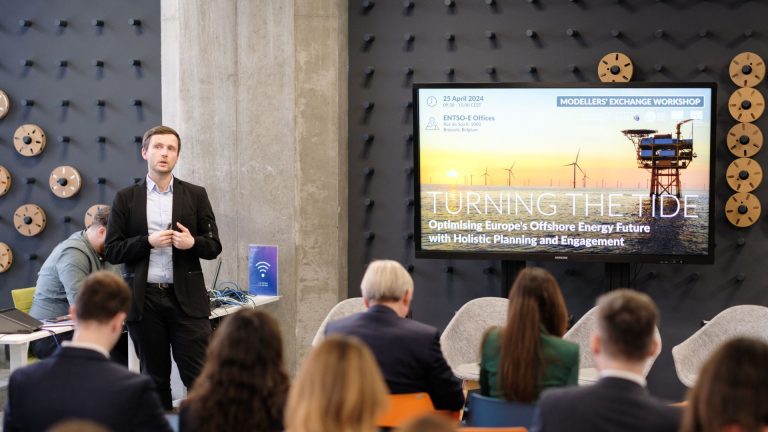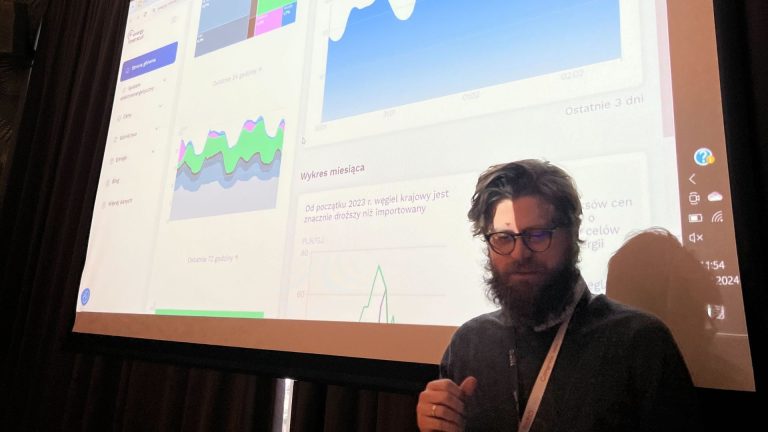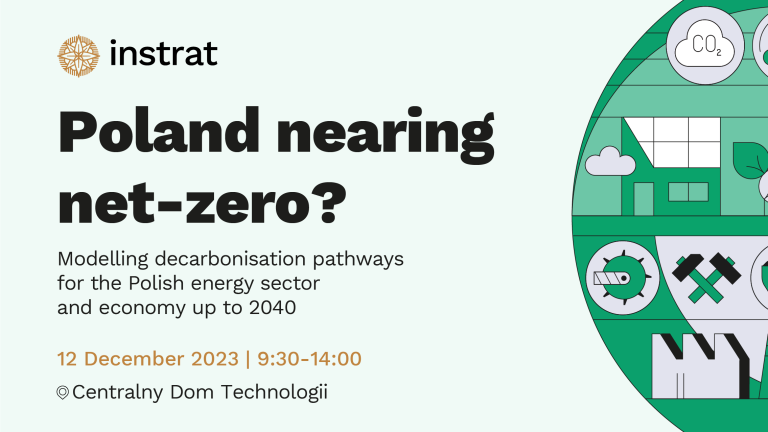The panel discussion was moderated by Robert Tomaszewski, Head of Energy Sector Desk at Polityka Insight and included the following speakers: Dariusz Dybka, Senior Vice President, Head of Sustainability at Edelman Brussels; Wanda Buk, Vice-President for Regulatory Affairs at PGE; Michał Hetmański, CEO of Instrat; and Ryszard Pawlik, Policy Advisor to Jerzy Buzek MEP.
Instrat’s Energy Modelling until 2040
Before the discussion started Instrat’s Head of Energy and Climate Research Program Michał Smoleń opened with a brief presentation with a sneak peek from the upcoming energy modelling study that will analyse the scenarios for the development of Polish energy system until 2040, with a deeper look into the cross-sectoral integration that offers additional, partly flexible demand from EVs, heat-to-power technologies and renewable hydrogen production. The results should also inform the policy making process amid ongoing discussions about the 2040 emission reduction targets and update of Poland’s NECP and its energy strategy (PEP2040).
Priorities for the new government
In the gathering moderated by Robert Tomaszewski, the spotlight turned to a critical inquiry: What should take centre stage in the energy policy of the incoming government, irrespective of the election outcome? The dialogue naturally gravitated towards three pivotal dimensions. Firstly, the tempo at which decarbonization should unfold, accompanied by a fresh social contract for this profound transformation. Secondly, how to implement unprecedented investments with the imperative to shield consumers from the mounting burden of energy expenses. And lastly, the debate over the transformation model itself – a poignant division within the Polish political landscape, pitting proponents of centralised and decentralised governance against each other.
Spotlight on the future of Poland’s coal bad bank, NABE
In a pivotal moment for Poland’s energy landscape, the current government has embarked on one of its biggest transformation projects, aiming to shift coal assets from the four state-controlled energy companies to a newly established coal bad bank, National Energy Security Agency, NABE. However, this transition remains uncertain pending the upcoming elections. Should the opposition seize power, their plans include the cancellation of this project. Instrat has stressed in the past the risks arising from increasing market concentration – consolidating control over all coal power plants, responsible for ca. 60-70% of current electricity generation would drive electricity prices further up. Both the Ministry of Climate and Environment and energy regulator (URE) have submitted their critical feedback in the public consultation process, citing Instrat’s research too.
The debate in Brussels provided a platform for the clash of these opposing positions, with Wanda Buk representing PGE, one of the companies slated to transfer its assets to NABE, and Ryszard Pawlik reflecting some of the positions represented in the past by MEP Jerzy Buzek. Without NABE, PGE might struggle to secure corporate financing of future investments due to an incomplete transition away from coal. Ms. Buk argued that centralising assets into a single entity offers greater manageability and enhances the government’s capacity to negotiate public aid arrangements with the European Commission and secures the rules for governance of coal power plants which we will still need to balance the stability of the grid.
Michał Hetmański of Instrat posited that the paramount goal for Poland’s new government, regardless of political orientation, should be the establishment of a new comprehensive governance framework for the energy transition. Both major parties suggest reform of the current scheme and propose establishment of the new dedicated ministries for energy and/or industry transition. Concentrating all authority in NABE, he argued, is an ill-advised approach. Regarding the regulatory framework for distribution assets, Hetmański advocated a middle ground, emphasising the need for balance between decentralisation and state monopoly.
Dariusz Dybka expressed scepticism about the speed of Poland’s coal exit strategy, citing discussions dating back 15 years with limited progress. He called for a candid dialogue on the eventual phase-out of coal-based energy in Poland.
Beyond capacity market – what subsidies for coal power plants?
The European Commission’s Electricity Market Design reform, initiated this year in response to the energy price volatility stemming from the fossil fuel price crisis triggered by Russia’s invasion of Ukraine, faces a precarious situation. A last-minute effort to introduce coal subsidies threatens to overshadow the essential objectives of this reform. These include ensuring the European power market’s resilience for the future by enhancing the significance of demand-side flexibility as a substitute for the fossil fuel-dependent price-setting function.
Ryszard Pawlik explained that Polish factions in the European Parliament have jointly endorsed prolonging capacity market payments to coal power plants beyond 2025 as an interim measure, but he remained doubtful about its approval due to dynamics within the EU Council, particularly concerning the nuclear issue between Germany and France.
Michał Hetmański stressed that just prolonging subsidies for coal-based power plants is not a viable solution. Instrat’s energy system modelling indicates that cheaper gas-based electricity may drive more expensive coal power plants out of the system earlier for economic reasons. He also called for increased cross-border energy capacity.
Both Hetmański and Dybka concurred that stronger coordination among stakeholders and enhanced cooperation between Brussels and Warsaw are essential for a successful energy transition in Poland.
Nuclear and hydrogen
Dariusz Dybka noted that discussions on nuclear power in Brussels are biassed in favour of nuclear power due to France’s significant influence in the EU.
Ryszard Pawlik acknowledged that delays in Polish nuclear projects transcend the current government, extending to the previous administrations. While a business case exists for nuclear projects, the risk lies in the capacity to implement them successfully. He warned against a scenario where, by 2030, development of new renewable energy sources are downscaled and no nuclear power utilities materialise due to unfulfilled ambitions.
Michał Hetmański was unequivocal in his message, emphasising that Polish governments are delaying transformation of the power system towards green and clean energy sources. Nuclear can be definitely helpful in balancing the grid amid vastly increasing electricity demand driven by sectoral integration, but the cost argument is dependent on timely delivery of nuclear project. High cost of capital for nuclear power can drive up delay costs, making the project highly uncompetitive on the electricity market. Hetmański stressed the government’s failure to present the financing model, either based on CfD or other schemes, but acknowledged progress in the environmental permitting process. All parties agreed that we need a definitive political decision if we are going in the nuclear direction or not.
Regarding hydrogen, experts highlighted the industry’s growing demand for hydrogen as a means to facilitate production. Poland currently lacks an industrial strategy, which also should be a priority for the new government after the elections. Hydrogen should not be seen as an energy source but as an energy carrier for decarbonising hard-to-abate sectors and solutions, such as steel production.
The future of energy policy
All parties concurred that Poland urgently needs an updated national energy strategy. Existing strategic documents, such as the Energy Policy of Poland until 2040 (PEP2040) and the National Energy and Climate Plan, have not been revised since the Russian invasion of Ukraine and the ensuing energy crisis.
The challenge of steering energy transitions amid rising investment costs, increased regulatory complexities, and economic uncertainties will persist, regardless of the election outcome. Therefore, establishing a clear path for Poland’s energy transition ecosystem through up-to-date strategic documents is imperative for the incoming government. This call to action stems from the energy crisis and serves as a response to the evolving landscape. The road ahead is uncertain, but Poland’s energy future remains a pivotal issue in the coming years.
The event has been delivered with the support of the Minor Foundation for Major Challenges.






